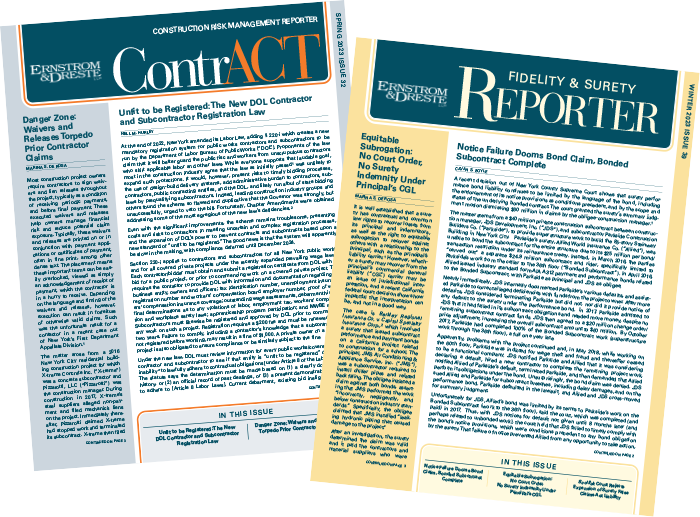Article by: Cavan S. Boyle
In a case of first impression for Indiana, the state’s intermediate appellate court recently held that the common law duty of good faith recognized between insurers and insureds does not extend to a surety-obligee relationship under performance and payment bonds in construction projects.1 The ruling resulted in the dismissal of the obligee’s bad faith claim against the surety.
The decision stems from a construction contract between the owner-obligee, Posterity Scholar House, LP (“Posterity”), and the general contractor-bond principal hired to construct two apartment buildings. The contract required performance and payment bonds, which were issued by FCCI Insurance Company (“FCCI”).
Alleging default by the general contractor, Posterity filed claims on the performance bond and demanded that unpaid subcontractors be paid under the payment bond. However, upon investigating Posterity’s claims, FCCI determined that Posterity was in default, not the general contractor, and denied Posterity’s claims. Posterity filed suit against FCCI for breach of contract and tortious bad faith.
FCCI moved for partial summary judgment on Posterity’s bad faith claim, arguing that no duty of good faith exists between FCCI and Posterity. The trial court granted FCCI’s motion and the Indiana Court of Appeals affirmed.
On the appeal, Posterity argued that Indiana’s common law duty of good faith found between an insurer and its insured under insurance policies should extend to the contractual relationship between surety and bond obligee, thus permitting surety liability on the bad faith claim.
The appellate court noted that the case presented an issue upon which states are divided. The court examined the Indiana Supreme Court decision that established a good faith duty between insurers and insureds based on their “special relationship”2 and rejected Posterity’s argument, finding that “special relationship” lacking between the surety and the bond obligee.
The court observed contractual differences between the insurer-insured and surety-obligee relationships and determined the essential nature of the promises differ. The insurance contract, the court explained, is a bilateral agreement whereby the insured shifts its risk of loss to the insurer. A suretyship, by contrast, is a “tripartite arrangement in which one party (the surety) guarantees that a second party (the principal) will perform its contractual obligations to a third party (the obligee).” Under this arrangement, the principal retains the risk of loss. In this sense, the court reasoned, “a surety bond is a financial credit product, not an insurance indemnity product.”
Next, the court found the state’s inclusion of surety bonds as a class of insurance under the Indiana Insurance Code is not determinative. What gives rise to an insurer’s common law duty of good faith is the special relationship between insurer and insured, not its inclusion in a regulated industry, said the court.
Finally, the court confirmed the special relationship between insurer and insured is a fiduciary relationship that arises from an insurer’s duty to defend an insured against claims born out of the close, arms-length transaction of purchasing the insurance policy. This relationship does not exist between a surety and bond obligee, the court observed, where the surety bears no responsibility to defend an obligee against third party claims, nor has any right to represent the obligee’s interest by virtue of the surety bond. Instead, that type of relationship is present only between the surety and its bond principal.
The issue of surety vulnerability to obligee bad faith claims is an important one nationwide. Adding Indiana to the states that recognize the important distinctions between surety and insurance on this subject is a positive result for the surety industry. Still, some states’ laws are more nuanced and will imply into every contract a duty of good faith and fair dealing, and surety bonds are treated no differently. However, unless expressly set forth under the terms of the principal-obligee contract, a surety’s duty of good faith to the obligee may arise only upon a formal declaration of default made by the obligee, at which time the surety must investigate the claim in good faith.3 Prior to that, in such states, the surety may owe no duty to the obligee other than what the principal owes under the contract, and what constitutes good faith or lack thereof depends upon the facts of each case.4 Thus, the Posterity decision is a valuable reminder that to truly evaluate the risk of bad faith claims, the surety must be aware of applicable state law and, depending on the jurisdiction, the terms of the underlying bonded contract.
- Posterity Scholar House, LP v. FCCI Ins. Co., 205 N.E.3d 1018 (Ind. Ct. App. 2023).
- Erie Ins. Co. v. Hickman, 622 N.E.2d 515 (Ind. 1993).
- See U.S. Fid. & Guar. Co. v. Braspetro Oil Servs. Co., 369 F.3d 34, 64 (2d Cir. 2004).
- See PSE Consulting, Inc. v. Frank Mercede & Sons, Inc., 838 A.2d 135, 160 (Conn. 2004).




